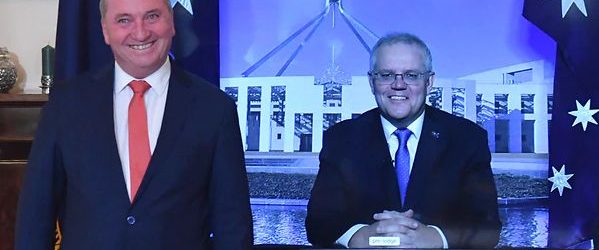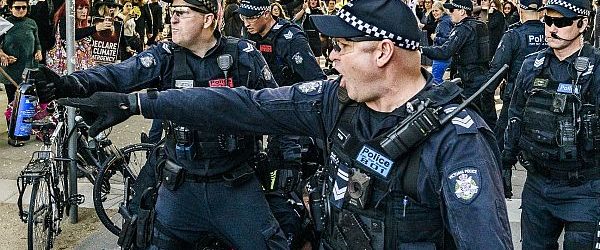Head to the website for the joint Fairfax and Four Corners’ investigation into the influence of Chinese donors in Australia’s political landscape and you’ll note the five-pointed star, accompanied by four smaller stars, taken straight from the flag of China. The site’s slick GIFs and lack of advertisements tells visitors that this is Serious Journalism. Why, then, does the investigation rely upon the tired tropes of ‘Reds under the Beds’ and the ‘Yellow Peril’ to sow fear regarding the influence of the Chinese Communist Party (CCP) in Australia?
The story broke in early June. Leading the team were seasoned investigative reporters Nick McKenzie and Richard Baker, both of whom have won multiple Walkleys. Along for the ride were Chris Uhlmann and Sashka Koloff of Four Corners. With such a hard-hitting line up of journalists, readers and viewers might expect an investigation that uncovered the dirty secrets behind large donations to Australian political parties – certainly there are problems with our system of political donations – but the end result of this expose was a few tenuous, Sinophobic accusations. It’s unfortunate because couching the political donations issue in the figurative language of a Chinese conspiracy avoids asking the harder questions – which would involve considering structural solutions to this democratic deficit.
The joint investigation largely relies upon evidence from unnamed sources in the Australian intelligence bureaucracy. Two of the named sources are academics working in Australia-China relations, and both offer only surface-level readings of events. For instance, Swinburne academic John Fitzgerald’s comments on Sheri Yan, who is accused of having sought influence in Australian politics on behalf of the CCP: ‘I understand that Sheri Yan is very closely connected with some of the most powerful and influential families and networks in China … Once you know that, you don’t need to know much more.’ This guilt by (rumoured) association implies that Chinese people overseas are merely conduits for Communist Party motives; and renders these individuals as unthinking puppets for malicious and amorphous figures who lurk overseas, directing the individual’s actions from afar.
The second named source is Professor Rory Medcalf of the Australian National University. Medcalf follows a similar line to Fitzgerald: ‘Even if they’re not receiving any kind of direction, they would feel some sense of obligation, or indeed to make the right impression on the powers that be in China, to demonstrate that they’re being good members of the party, that they’re pursuing the party’s interests.’ Does the unnamed plural pronoun used here refer to all Chinese people who donate to political parties in Australia? Such a suggestion echoes the Sinophobic discourse of Australian history, which can be traced back to the violence directed at Chinese gold miners in the mid-nineteenth century. At the time, Chinese miners were accused of undermining Australian rugged individualism by working in collectives, and sharing profits.
The investigation suggests that Chinese people in Australia, whether Australian citizens with a long history of settlement in Australia (thus pre-dating the existence of the CCP) or recent arrivals, are susceptible to and motivated by the party’s influence. The Australian government, note the investigation’s journalists, ‘believed the Chinese Communist Party was working to infiltrate Australian political and foreign affairs circles as well to gain more influence over the nation’s growing Chinese population’. The whole series makes it seem as if Chinese Australians are communist cadres lying in wait for direction from the Beijing politburo, delivered through inscrutable Chinese-language media and other codes. The assertion that a group as large and amorphous as the Australian-Chinese diaspora could be utilised, en masse, to serve the foreign policy objectives of the Chinese state would seem laughable, if not for the framing opinions of Medcalf and Fitzgerald. There is little factual basis to support such a claim of latent loyalty; indeed, the series does not attempt to give any broader understanding of the feelings of the Chinese diaspora towards the Chinese state, and only focuses on a few select individuals. Presumably, readers and viewers are meant to conclude that Chinese presence in Australia is inherently foreign and threatening.
A key moment recounted in the story is when Duncan Lewis, the head of ASIO, presented a diagram to senior officials of the Liberal, Labor and National parties, purporting to warn them of the direct relationship between wealthy Chinese donors and the CCP. At the top of the page was a diagram representing the Party, and two lines connected the diagram to Dr Chau Chak Wing and Huang Xiangmo. Although purely symbolic, the diagram is taken as illustrative of the close links between these two individuals and the CCP – even though, as the series notes, Chau and Huang disliked each other and had very different ways of cultivating influence in Australia’s major political parties. (In the series, Dr Chau’s CCP connections are evidenced by the fact that he owns a newspaper and is a member of a provincial-level People’s Political Consultative Conference.)
It’s important to note, too, that the actual impact of the donations on policy or decision-making has been limited, beyond a revelation that Senator Sam Dastyari didn’t toe the Labor line on the South China Sea, something that we knew back in August 2016. Yes, the role of Huang Xiangmo is new, but Senator Dastyari’s pronouncement did not shift Labor policy on the South China Sea.
That a major investigation by Fairfax and Four Corners can rest on such weak foundations suggests that Sinophobia is alive and well in Australian journalism. Moreover, in this case, it distracts debate from the very real power that political donations, both foreign and domestic, have to distort democracy in Australia.
The solution proposed by the series is to ban foreign donations – US Republican Congress member Mike McCaul is brought in to testify to that. What is not mentioned is the crippling effect that donations from large pharmaceutical companies, the military industrial complex and super PACs supported by the religious right have had in the United States. It seems farcical to take recommendations on political donations from such a source.
In contrast, Katharine Murphy has been consistent in arguing in the Guardian and elsewhere, like Meanjin, that the problem with political donations runs much deeper than foreign influence. The lack of real-time disclosure, little public funding for elections, an Australian Electoral Commission without any punitive powers and no Federal ICAC means that Australian representatives will continue to be beholden to those who give them large wads of cash, not the voters who elect them. Individual cases of influence-buying by Chinese nationals and naturalised Chinese Australians is a mere symptom of this much deeper problem; and framing the account in Sinophobic language only further muddies turgid political waters.



